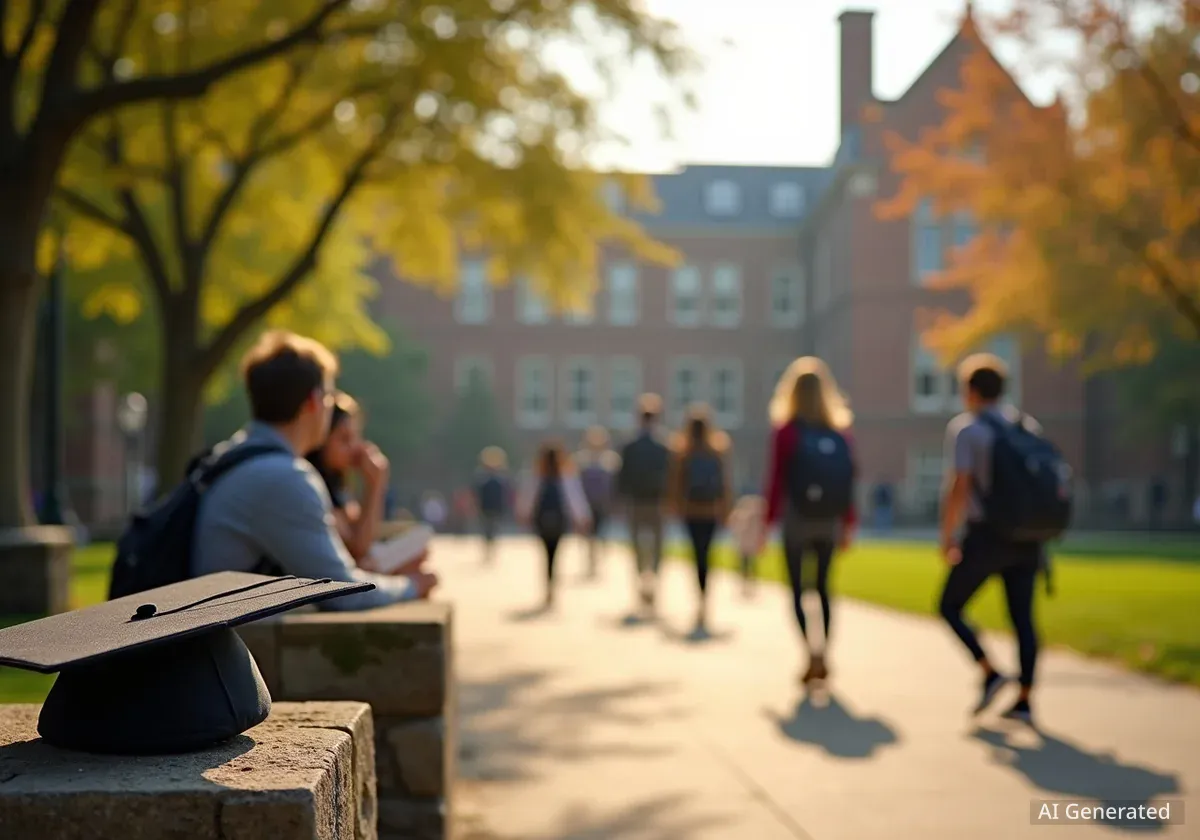Several Georgia institutions have secured prominent positions in the latest U.S. News & World Report college rankings. While Emory University, Georgia Tech, and the University of Georgia maintained their places among the top 100 national universities, numerous other colleges across the state received high marks for innovation, social mobility, and teaching quality.
The annual report evaluates schools on various metrics, offering a detailed look at higher education performance. For Georgia, the results highlight a diverse range of strengths, from top-tier research universities to liberal arts colleges focused on student success and value.
Key Takeaways
- Emory University, Georgia Tech, and the University of Georgia are ranked among the top 50 national universities.
- Spelman College was named the No. 1 Historically Black College and University (HBCU) for the 19th consecutive year.
- Agnes Scott College ranked as the most innovative national liberal arts college for the eighth straight year.
- Georgia State University was recognized as the top public university for undergraduate teaching for the sixth consecutive year.
- Multiple Georgia schools earned high rankings for social mobility, value, and specific academic programs.
Top National University Performers
Three of Georgia's largest research institutions continue to be recognized among the nation's elite. Emory University leads the state's representation, securing the No. 24 spot among all national universities.
The Georgia Institute of Technology followed, ranking at No. 32. The University of Georgia also placed firmly within the top 50, coming in at No. 46. These rankings are based on a wide range of factors, including graduation rates, faculty resources, and academic reputation.
Understanding the Categories
U.S. News & World Report classifies institutions into different categories. "National Universities" offer a full range of undergraduate majors, master's, and doctoral programs, and are committed to producing groundbreaking research. Other categories include "National Liberal Arts Colleges," "Regional Universities," and "Regional Colleges."
Leaders in Liberal Arts and HBCU Excellence
Georgia's historically Black colleges and universities (HBCUs) and liberal arts colleges demonstrated significant achievements in the latest rankings. Spelman College continues its long-standing legacy of excellence, named the No. 1 HBCU in the country for the 19th year in a row.
Interim President Roz Brewer commented on the achievement, stating:
"Being recognized as the nation’s top HBCU for the 19th consecutive year is a tremendous honor and a reflection of our unwavering commitment to academic excellence, leadership development and the empowerment of our students."
Spelman also ranked No. 37 among all national liberal arts colleges and placed No. 2 in that category for social mobility. Nearby, Morehouse College, an all-men's institution, moved up two spots to become the No. 3 HBCU. It also ranked 96th among national liberal arts colleges.
Innovation and Student Experience
Agnes Scott College, a private women's school in Decatur, was named the No. 1 most innovative national liberal arts college for the eighth consecutive year. The college also earned high marks for first-year experiences (No. 2) and study abroad programs (No. 6).
"From exemplary interdisciplinary curricular experiences to first-year global travel for every student... we lay a solid foundation for students to succeed while in college and, even more importantly, after graduation," said President Leocadia I. Zak.
Oglethorpe University in Brookhaven was noted for its commitment to student access, ranking No. 56 among liberal arts colleges for social mobility. The university reported that approximately 40% of its students are eligible for Pell grants and 40% are the first in their families to attend college.
Clark Atlanta's Social Mobility Ranking
Clark Atlanta University, a historically Black university, ranked 52nd nationally for social mobility. This placement tied it with Princeton University, which was ranked the No. 1 overall national university.
Regional Institutions Earn High Marks
Several Georgia schools classified as regional universities and colleges were recognized for their value, teaching, and overall quality. These institutions typically focus on undergraduate education and offer some master's programs.
Berry College, located near Rome, ranked No. 4 among regional universities in the South. It stood out in several key areas, earning the No. 1 spot for best value and No. 1 for undergraduate teaching programs within its category.
President Sandeep Mazumder attributed the success to the preparedness of its graduates. "We attribute our well-documented inclusion here to Berry graduates and how they are known for a sense of purpose, work ethic and habits of mind, that gives them a distinct advantage in their professional lives," he said.
Georgia College & State University (GCSU) was ranked No. 12 among regional universities in the South. Notably, it climbed to No. 5 among public schools in the region, an improvement from previous years.
"These rankings — including breaking into the Top Five in the South for the first time in university history — reflect a period of sustained and remarkable growth for Georgia College & State University,” said President Cathy Cox.
Recognized Regional Colleges
Among regional colleges in the South, a category for smaller schools focused on undergraduate education, several Georgia institutions performed well.
- Wesleyan College: Founded in 1836, this private women's college ranked No. 5 in the region and No. 9 for social mobility.
- LaGrange College: Ranked No. 9 overall in the category and was noted for its value, placing at No. 22 for best value among 96 schools.
Specialized Recognition for Teaching and Innovation
Beyond general rankings, U.S. News highlights institutions for specific strengths. Georgia State University (GSU) has built a national reputation for its focus on student success and innovative methods.
For the sixth year in a row, GSU was named the No. 1 public university for undergraduate teaching. It also ranked No. 8 nationally for most innovative schools and No. 17 for social mobility.
"This acknowledgment affirms that our data-driven strategies and steadfast dedication to student success are not only meeting the mark but truly elevating outcomes across our university," stated GSU President M. Brian Blake.
Clark Atlanta University (CAU) also received specialized recognition. In addition to its high social mobility score, CAU ranked No. 16 among all HBCUs, and its business school was listed among the top 100 in the United States.
President George T. French Jr. said, "We are proud to stand alongside the country’s most competitive institutions and remain focused on equipping our students to thrive in today’s dynamic, innovation-driven economy."





